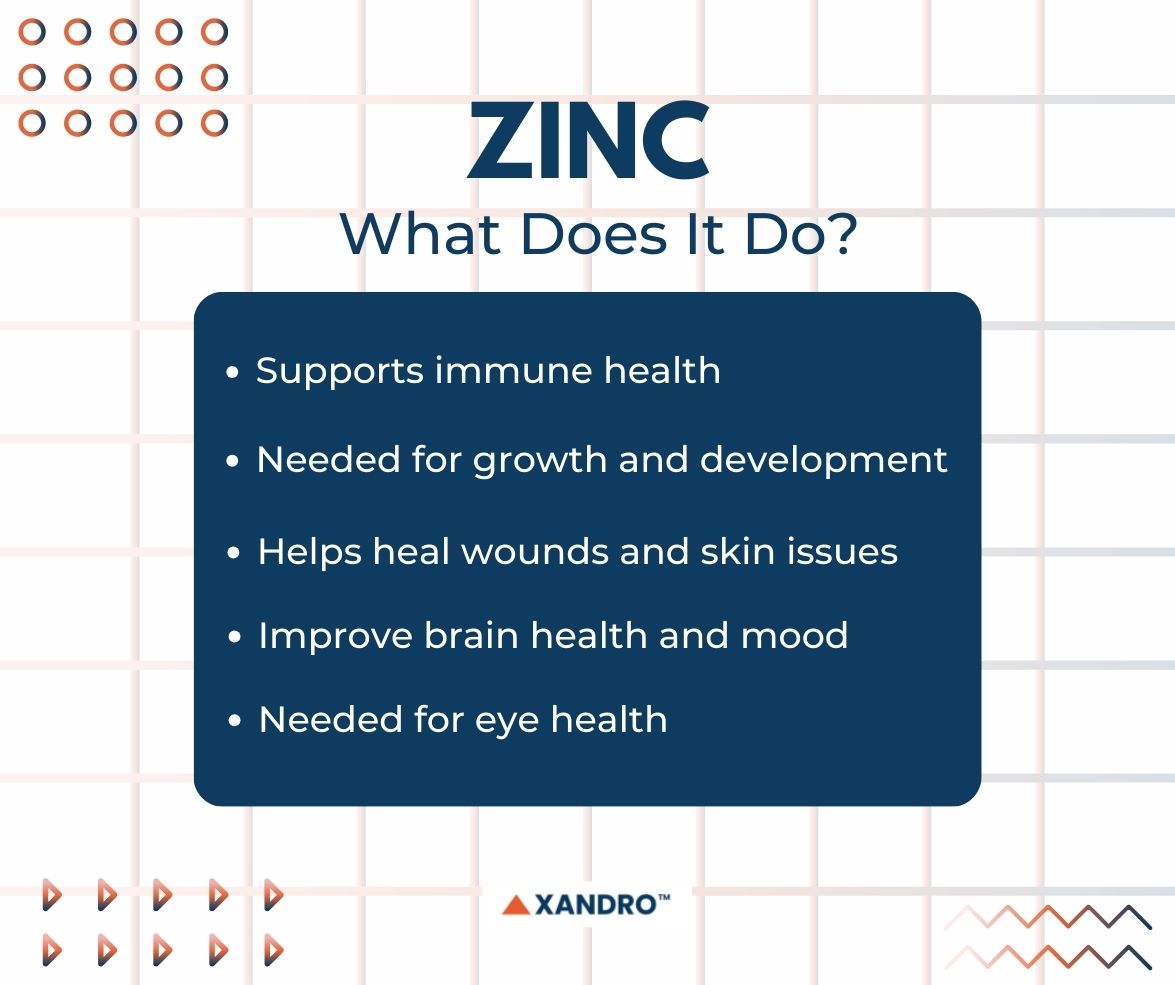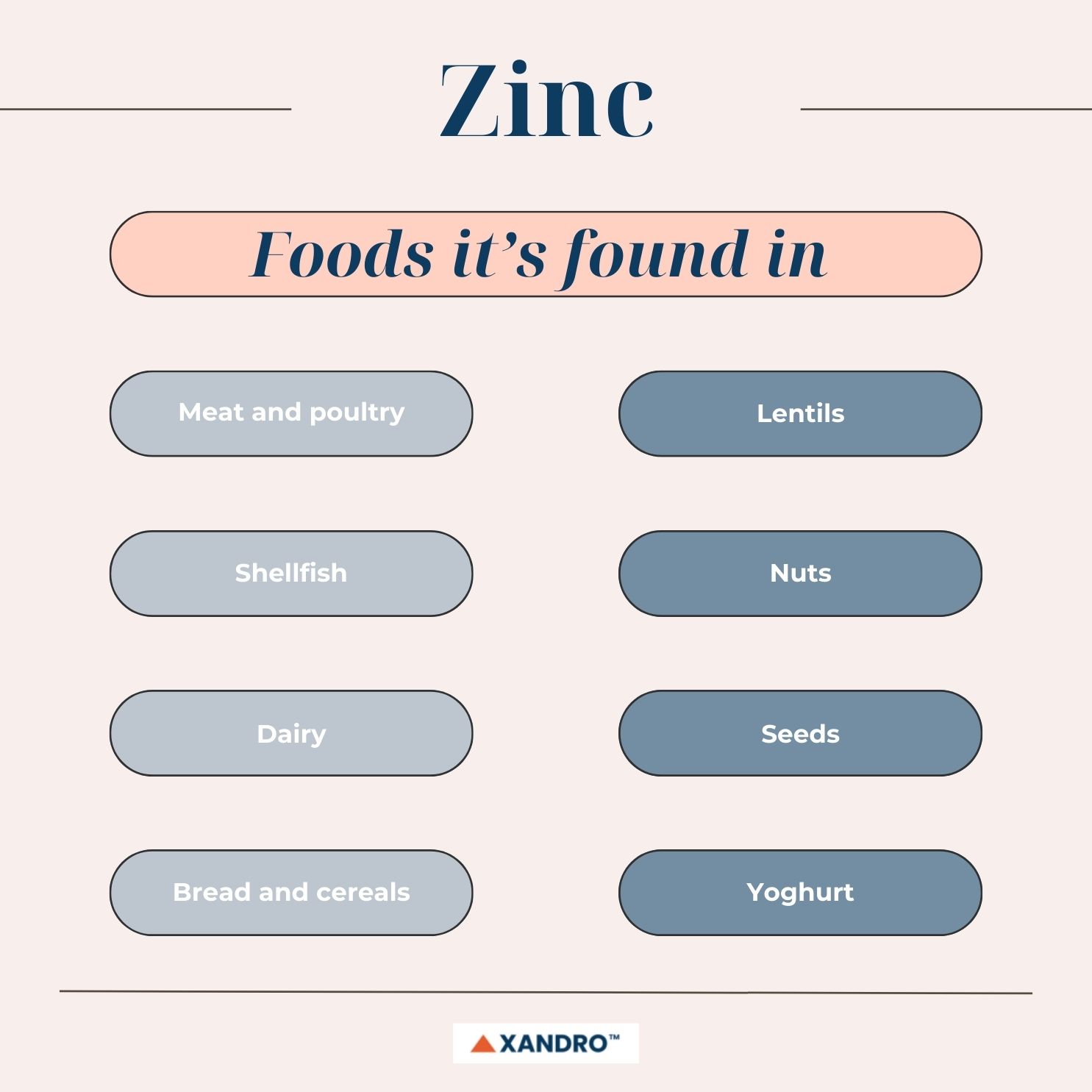Does Zinc Promote Weight Loss?
6th Apr 2024
Can Zinc Make Me Lose Weight?
What is Zinc?
Zinc is an essential trace mineral. What this means that that while it’s incredibly important for many functions in our body, such as helping combine and create our DNA, healing wounds and supporting our immune system, we only need small amounts of it.
Since we don’t produce zinc naturally, we need to get it through our diet. You can generally get enough through the foods you eat, but if you’re at a stage in life where you’re finding it difficult to get all the required nutrients you need, such as if you’re fasting, travelling or working irregular hours, a supplement may be required once you’ve spoken to your medical professional.
What Does Zinc Do for The Body?
Let’s go through what zinc actually does in our bodies.
Supports Immune Health
If you’re looking how to boost immune system, one of zinc’s most important functions is to support our immune system. It does this by activating immune cells when it detects bacterium and viruses, as well as by supporting cells that deal with immunity, helping out in the body’s first line of defence. Zinc can also be taken to reduce how often we get illnesses, possibly even reducing how low we have a common cold for.
Needed for Growth and Development
Another way zinc is needed is when we’re children and going through adolescence. It helps support proper growth and development, helping with something called DNA synthesis. Basically, it helps cells grow and then multiply — needed when we grow fast, such as in childhood and in pregnancy. It’s due to this that zinc sufficiency can stunt growth.
Helps Heal Wounds
Those who are low in zinc have been shown to heal worse from wounds than those who aren’t, with zinc playing a major role in all areas of wound health, such as membrane repair and scarring.
Needed for Eye Health
If you’re at risk of developing age-related macular degeneration, zinc supplements may help in its prevention.
Processes Food
Zinc helps in processing carbohydrates, fats and protein from the foods we eat.

What does zinc do for a woman’s body?
Other than what’s mentioned above, such as boosting your immune system, zinc is also an antioxidant, helping to reduce the damage caused by free radicals. It increases the levels of compounds such as glutathione, catalase and heme-oxygenase, helping halt the development of wrinkles and fine lines, along with joint pain.
The skin is actually the third most zinc-abundant tissue in the body, showing just how important zinc is for skin health. Zinc deflects UV rays that damage the skin and what’s more, if you’re looking for how to increase collagen, zinc is also needed for collagen formation, DNA repair and for reducing acne and the severity of inflammatory skin conditions, such as eczema, psoriasis and rosacea.
Zinc is also needed for fertility, both in men and women. In women, it’s used in the metabolism of androgens and the sex hormones, estrogen and progesterone, and once pregnant, zinc is incredibly important for the development and health of the baby.
Zinc may also help improve our brain health and mood. Zinc has neuroprotective effects, along with playing a key role in regulating the activity of our HPA (hypothalamic-pituitary-adrenal) axis, which plays a major role in hormone balance and mood. This is because zinc is found in neurons throughout our brain responsible for our emotions, memory and learning. If you’re experiencing shifts in your mood, you might have a zinc deficiency!
How long does it take to see benefits from zinc supplements?
This depends on what you’re taking zinc for and whether you’re deficient or not, but you might start experiencing benefits from zinc supplements:
- Topical zinc for mild acne: within two weeks
- Reduction in the appearance of acne: up to three months
- Diarrhea: within 24 hours
- Skin lesions: one to two weeks
Foods That Contain Zinc
The recommended daily allowance of zinc is between 8 and 11mg, which if on a 2,000-calorie diet, comes to 11mg of zinc per day. Men need 11mg and women need 8mg, 11mg if pregnant and 12mg if breastfeeding. Don’t take more than 40mg of zinc per day.
Zinc rich foods include:
- Meat, such as beef, lamb, chicken and turkey
- Shellfish, oysters and shrimp
- Dairy foods
- Bread
- Cereals
- Lentils
- Sesame seeds
- Pumpkin seeds
- Chickpeas
- Plain yoghurt
- Cashews

Zinc Supplements and Weight Loss
What about the question, ‘Does zinc reduce belly fat?’
There is limited research showing that zinc may help reduce body weight, BMI, waist circumference and hip circumference in those with obesity. This may be due to zinc’s role in metabolism. Participants took 30mg of zinc per day and were on a restricted-calorie diet.
Does zinc speed up metabolism? Another way zinc may help metabolism is due to the thyroid gland needing zinc to produce thyroid hormone, which helps maintain our metabolism and energy.
A systematic review found that zinc supplementation decreased body weight in those who are overweight and obese but otherwise healthy, and while more high-quality studies are needed, at this stage, zinc may be linked with body weight.
It’s thought that those with low levels of zinc due to diabetes also have poor insulin resistance, possibly further causing issues with weight management and blood sugar levels.
Does zinc help with loss of appetite? Yes, low levels of zinc may actually worsen food disorders, making you not feel like eating. Zinc deficiency has been found to induce a range of psychological problems, such as anorexia, growth retardation, taste disorders dermatitis and hypogonadism. Eating a diet with enough zinc can stimulate food intake in those who are deficient in the mineral.
Nutrient Combinations to Help with Weight Loss
People commonly ask, ‘What about combining magnesium and zinc for weight loss?’ Both magnesium and zinc supplements may indirectly contribute to weight loss by preventing deficiencies. Magnesium may help regulate blood sugar and insulin levels in those who are overweight or obese, as well as help with bloating and water retention, while zinc may indirectly help with metabolism and those with diabetes and poor insulin resistance.
Try out Xandro Lab’s Magnesium Glycinate 500mg to see how it can benefit you!
What about vitamin C and zinc for weight loss? Vitamin C is an antioxidant, helping speed up your metabolism and burn more calories by counteracting exercise-induced oxidative stress. It also helps with iron absorption, with iron being needed to carry oxygen to our muscles, making them work as they should and therefore, burn more fat. This means that those with higher vitamin C levels burn fat faster during exercise.
Making sure you have a wide range of vitamins and minerals in your diet can prevent you from having deficiencies that can directly or indirectly cause you to gain weight or make you struggle to lose weight.
End Note
So, does zinc help with losing weight? If you’re low in zinc, improving your zinc level may help you lose weight through various means. The zinc deficiency belly fat correlation is similar to other vitamin and mineral weight loss links.
Not getting enough of any essential vitamins and minerals can lead to a number of health problems, including losing weight. It’s best to shift your diet to include a wide range of nutrients, otherwise, our bodies can find it difficult to function properly.
Want to learn more about the best supplements for weight loss? Read our article here! Or, read all about weight management and how you can live a healthy lifestyle here!
Keep an eye out for Xandro Lab’s upcoming zinc chelation supplement, zinc picolinate!

